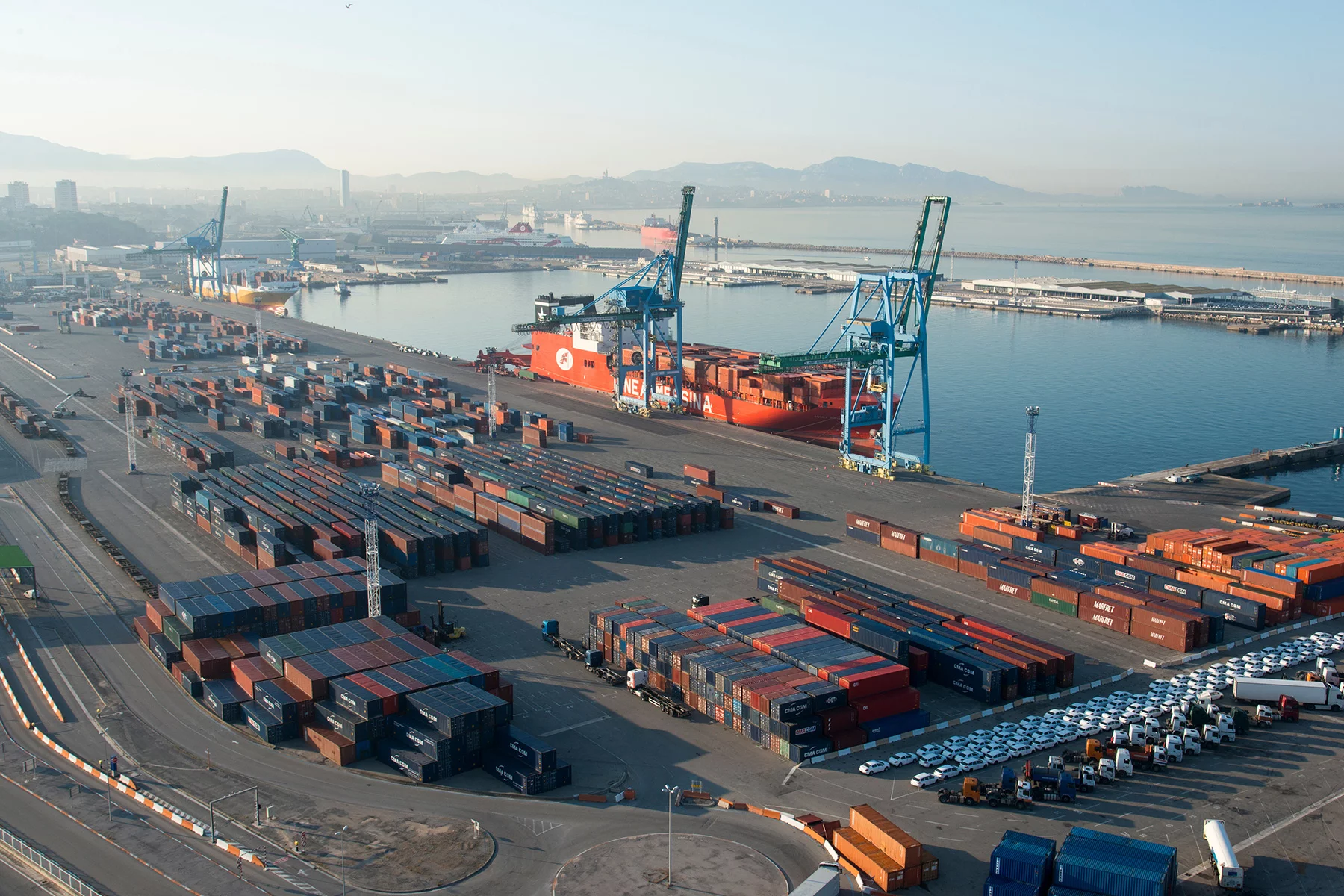Relocating your entire life to France might seem like a daunting prospect, but it doesn’t have to be. By following our essential checklist, you can make moving to France as seamless as possible. One of the most important things you’ll need to sort out is how to transport your belongings to France. Thankfully, you have plenty of options, whether by air, rail, road, or sea.
Before moving, it’s a good idea to think about what’s important to you. Perhaps you want to save money. Or you’re short on time. Maybe you’re looking for the easiest way to move at any cost. With our handy guide to relocations, you’ll find the right option for you and soon be enjoying the elegance of Paris, the sun-kissed glamor of the French Riviera, or even the rustic magic of the French countryside. This guide covers the following topics:
The Relocator
Pitching up in Paris or saying bonjour to Bordeaux? Wherever you're heading, take the stress out of your move to France by letting The Relocator find the right international shipping options for you. Compare a number of trusted international movers and get a free quote in minutes. Wherever life in France takes you, get there with The Relocator.
International removals to France
If you’re moving to France, there are several things to consider before jumping in. For example, where you’re moving from and what you need to bring significantly impact the process. Therefore, you should be aware of the amount you need to move, how much time you have, and what your budget looks like. In addition, your items will likely need to pass through customs. Therefore, some of your possessions, such as cars, might require additional documents.

Another important question for your removals to France is whether you do it yourself or hire a global relocation company. This largely depends on how much time you have and your available funds. These companies typically take care of any potential issue that may arise, which is ideal for time-strapped expats – but not for those with tight budgets. To find out which option is right for you, there are a number of online platforms to help you compare, including:
These platforms are a great place to start your relocation journey, whether you end up using a relocation company or going it alone. They can give you a good idea of what’s out there in terms of your options and budget.
Relocation to France with air freight
Depending on where you’re moving from, you can have your belongings delivered quickly by air freight. France handles the second-largest volume of air freight and mail in Europe. International air freight and removal companies operate out of most major airports in cities such as:
- Lyon–Saint-Exupéry Airport
- Marseille Provence Airport
- Nantes Atlantique Airport
- Nice Côte d’Azur Airport
- Paris Charles de Gaulle Airport
- Toulouse–Blagnac Airport
Who should use air freight?
Air freight is almost always the quickest way to get your belongings from A to B, so it’s good if you’re on a short deadline. However, it’s far from cheap, as it charges by weight. Therefore, it’s best for smaller items as well as those you need urgently.
However, it’s not the best option if you’re looking at ways to live sustainably in France. Indeed, bear in mind that air freight emits around 500 grams of CO2 per metric ton per kilometer, far more than sea freight.

How air freight works
So you’ve decided your belongings need to arrive quickly, but how do you ship them by air freight? Many companies offer an express service, which will involve air shipment. The first step will be sourcing quotes.
First, decide on the level of service you need. For a parcel service, it will usually be as simple as filling out a form online. However, if you use a door-to-door relocation service, the company usually visits you to see your belongings to offer an accurate quote. Once you have chosen a company, they will provide you with flight details and arrange onward transit to your new address.
Air freight timings
Air freight’s main attraction is speed. You can usually get hold of your belongings in under a week. If you’re flying to France, you can also pay for extra baggage and receive your items soon after you exit the plane. However, this will understandably depend on what it is you’re transporting, as some goods are subject to restrictions and customs charges.
Air freight costs
The price for air freight can add up quickly. Most companies have a minimum shipping charge and then add on weight per kilogram. Prices start at US$1.50 per kilogram but can reach US$8 per kilogram during periods of high demand.
Packing for air freight
It’s usually possible to pack your own items for air freight or pay for a packing service. Although shipping by air is the least environmentally friendly option, you can ease your conscience by packing in sturdy, reusable containers or suitcases. Remember when packing that your items might be handled several times during the journey, so make sure they are well-protected.
It’s often more secure and less stressful to leave packing to the professionals. In addition, companies are gradually beginning to use more eco-friendly packaging to avoid waste. If you’re concerned, contact your shipping service to find out what sustainable options they use.
Finding an air freight company
How you arrange your air freight needs will largely depend on your circumstances. For example, if you’re using a global relocations company, they will sort this part of your move for you. However, if you arrange your own removals to France, you’ll need to find a logistics service that can ship your belongings by air. Search for quotes with these companies using a comparison platform, such as Parcel ABC.
Be aware that the price on the screen is often not the price you end up paying, as there may be additional costs such as insurance and packing. Once you’ve selected a few companies, call them to get a quote that includes these.
Relocation to France with sea freight
If you have a whole household to relocate to France and time isn’t such a pressing issue, you might find shipping your best option. France has several ports, the largest of which is Marseille Fos Port, which is among the largest ports in Europe.
Other French ports include:
- HAROPA Ports de Paris (Paris, Le Havre, Rouen)
- Port Atlantique La Rochelle
- Port Boulogne Calais
- Port of Dunkerque
Who should use sea freight?
Sea freight is an excellent option if you have a lot of things to move and you’re on a budget. It’s handy if you live far away, as you can cut down on costs compared to other methods. From elsewhere in Europe, though, it might be more straightforward to use road or rail transport.

Shipping belongings to France: how the process works
You have a few choices when it comes to shipping, from sending individual boxes to hiring an entire container. You typically have the following options:
- 20-foot container – suitable for the contents of a three-bedroom house.
- 40-foot container – suitable for the contents of a four-bedroom or five-bedroom house and a car.
- Groupage – if you’re sending a smaller load, you can group your belongings with other deliveries. While it’s cheaper, this can take longer as you’ll need to wait until the container is at full capacity.
When your belongings arrive at the port, they will go through customs and make the journey overland to your new home.
Freight timings
Unfortunately, shipping can be a long-winded process. Not only is sea freight slower than flying, but bad weather, high demand, strikes, and other issues can also affect its speed. Here are some very rough estimates of how long you’ll have to wait to receive your possessions:
- US East Cost – 12–35 days
- US West Coast – 31–45 days
- China – 20-46 days
- Brazil – 21-26 days
It’s a good idea to book your container as far in advance as possible – some companies suggest at least four to six weeks before your move. Don’t forget, the journey involves more than just crossing the water; consider how much time you need for customs and delivery at either side of the ports.
Shipping costs
When planning your removal to France, you’ll probably find that shipping by sea is the cheapest option. That’s because it’s based on size rather than weight, which means those heavy pieces of furniture won’t cost you too much.

Prices can vary widely; it usually depends on the route and demand. They can also change month to month, so it’s worth keeping in close contact with your shipping company to find out how much you might spend. You could spend between $25 and $140 per cubic meter for less than a container load. At a certain point, it might be worth shipping with a full container.
Packing for shipping transport
When you pack up for an overseas move, make sure your belongings are ready for stormy weather. Conditions on a ship can be both damp and bumpy. In addition, the move will likely involve multiple forms of transport, so pallets and packages need to be able to withstand some handling.
Some removal companies insist on packing your items themselves for insurance purposes. This is the case if you hire an international removals company. If you’re looking to make your packing eco-friendly, contact your removal company, as they will know which packaging will survive the move.
Finding a freight company
The first step when finding a freight company for your removal to France is working out whether you need a full container. You can then start sourcing quotes. There are plenty of price comparison tools to help you with this, such as:
Be sure to check our directory for more shipping companies and full-service relocation providers.
Road and rail removals to France
If you’re moving to France from a nearby country, you’ll probably carry out your removals by road or rail. Whether you decide to hire a vehicle yourself or bring in extra help to deal with the transport, relocating by road freight can be affordable, quick, and convenient.

France has excellent rail links with the rest of Europe, which are worth taking advantage of. For example, if you’re moving from the UK to France, you can send your belongings via the Channel Tunnel or bring small items with you on the Eurostar train service. A standard ticket on Eurostar includes two suitcases and hand luggage, so it’s suitable for small moves, especially for the eco-conscious.
International relocation companies
Hiring a relocation company to manage your removal to France will often cost more than arranging the individual parts yourself. However, it can also give you peace of mind that your belongings will make it safely and with the required paperwork (such as inventory lists and customs forms). This is particularly relevant if the journey uses multiple forms of transport.
Relocation companies usually offer complete door-to-door services, though some also offer tailored packages should your needs be different. For more information on what each company offer, it’s best to speak to them directly to discuss your move.
As there are plenty of options when it comes to choosing an international relocation service, you may want to compare your options. Helpfully, there are comparison websites to help you out. These include:
Finding the right international shipping provider can give you peace of mind while dealing with the other details of your move. Check ahead of time to avoid any last-minute surprises.
How to choose a relocation company
There are many reputable relocation companies out there, so it’s a competitive market. Naturally, though, this means it can be challenging to differentiate between companies and their services when looking for quotes. Therefore, it’s a good idea to start searching as early as possible; allow up to three months to sort out your removals to France, especially if you’re using a door-to-door service.
First, check that your shortlisted companies are registered with an industry body. Many will be registered with the associations for their country. Others will be part of international organizations such as the International Federation of Freight Forwarders Associations or the International Air Transport Association.

Next, source any personal recommendations or testimonials you can find. For example, online reviews can give you an idea of what to expect. Next, speak to each of the companies on your shortlist to find out how the service works, how you’ll be able to keep in contact throughout the process, and what happens if something goes wrong.
DIY versus using a relocation company
It’s possible to manage your relocation yourself, cutting out the need for a professional removal company. For some, it makes sense to carry out a DIY move. For instance, a student moving to France from elsewhere in Europe with two suitcases is very different from a family of four moving from the US with a car. If you’re moving from outside Europe and have a lot of furniture, it might be overwhelming to try to move your household by yourself.
Before setting out on the DIY route, consider how much time you’re willing to dedicate to the administrative and practical sides of moving your belongings. Work out, too, how much better off financially you’ll be by arranging things yourself. Of course, you could hire help for some of the process through a platform such as TaskRabbit.
Relocating vehicles and pets to France
If your family includes friends with four legs or four wheels, they need to be factored into your removal to France. While there are often a lot of documents involved, the process runs more smoothly if you know what to expect.
Moving pets to France
If you’re bringing a furry friend to France, your pet should be microchipped and have an EU pet passport. This passport contains information about your pet, as well as details of any vaccinations it has had. In addition, if you are moving from outside Europe, your pet might need testing to make sure it is rabies-free. You can read more about restrictions for specific animals, insurance, and containers in our guide to pet travel to France.
Importing vehicles to France
If you wish to drive in France and are planning to import a car, you won’t be able to sell it within two years of your arrival date. When you move from another EU country, you do not need to pay customs duties on your car. You will, however, need to present a quitus fiscal (tax deduction), which you can get from the business tax service in your area. To get your quitus fiscal, you’ll need even more documents:
- Proof of ownership (such as an invoice or receipt)
- A carte grise (a vehicle registration document which is available online)
- Proof of identity
- Evidence of your new address in France.
If you import a vehicle from outside the EU, you must pay customs duties and VAT (currently 20%) at a customs office. You will also need to show your certificate of conformity with EU standards, which the manufacturer should provide with the car. If you don’t have this certificate, you need an Isolated Receipt Report (RTI) from the Regional Directorate for the Environment, Planning, and Housing (DREAL).
Customs and importing goods into France
If you’re moving from another EU country, you won’t need to pay any duty on anything for personal use. This includes your belongings, furniture, and car. You will, however, need to provide a few documents.
In addition to your passport, you’ll need a valued inventory of the items you’re moving (completed in French) and proof of residence in France. You will also need an attestation de non-cession, which states that you’ve lived outside France for at least a year, have owned your belongings for more than six months, and will not sell them for 12 months.

If you’re moving from outside of the EU, you can import your belongings tax-free as long as:
- you’ve owned the items for at least six months;
- each item is listed in a signed and dated inventory, with indications of its value;
- you can prove you’ve lived outside the EU for at least a year;
- you have proof of residence in France, such as a letter from your new employer or an application to get a residence card.
Useful resources
- France Diplomacy – provides information for anyone moving to France.
- Douane France – outlines French customs procedures.
- Impots.gouv.fr – gives details on taxes in France.






